
Guaranteed Irish & The City Bin Co. – Altogether Better!
Guaranteed Irish is one of Ireland’s most enduring, recognisable and authentic symbols. It helps Irish consumers identify products and services that are an all together a better choice for the life of their community and Ireland – and has done so for the last 50 years.
By meeting the Guaranteed Irish criteria, The City Bin Co. is now recognised as a business committed to Irish Jobs, Communities, and Provenance.
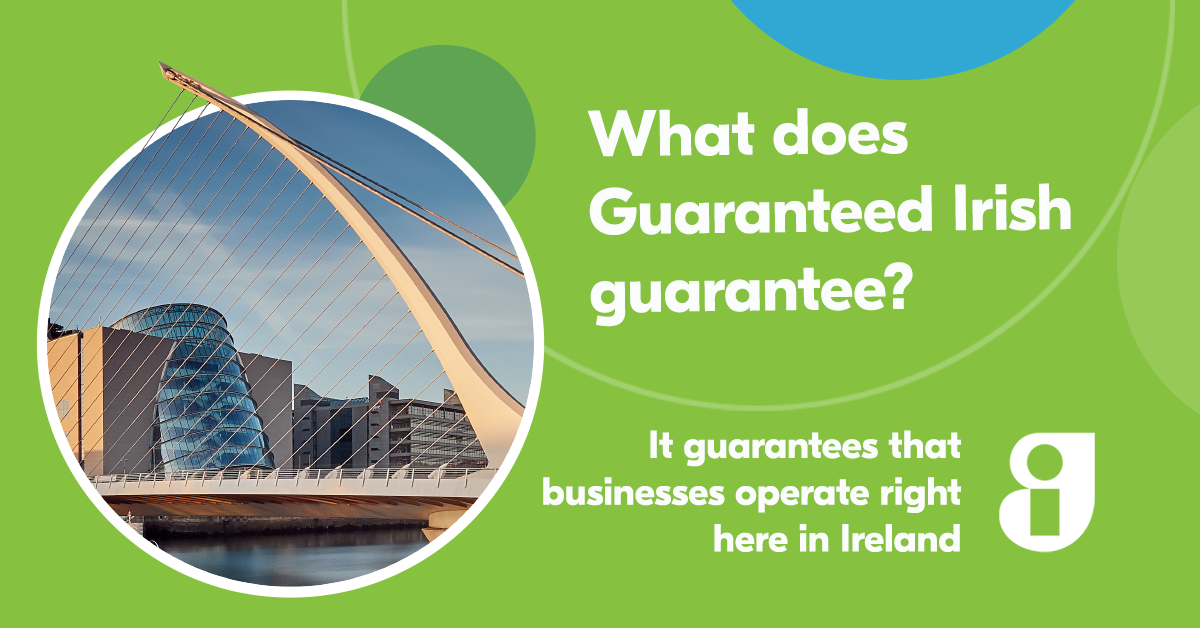
From large companies to SMEs, its members span a range of industries, all united by their shared commitment to contributing positively to supporting local jobs and the communities these jobs are based in. For consumers, the ‘G’ is an assurance that their money is going toward supporting jobs and sustainability efforts right here in Ireland.
With 91% of consumers agreeing that buying from Guaranteed Irish members helps sustain local jobs, the organisation is poised to play an even greater role in the decades to come & we look forward to playing our part.

Galway United Signs Up for Sustainability with The City Bin Co.
—and this season, we’re taking that quite literally! We’re delighted to announce that we are now Galway United’s official Sustainability Partner, helping to make Eamonn Deacy Park a cleaner, greener place for fans and players alike.
Three Up Front: Recycling, Waste, and Sustainability
As part of this partnership, we’ll be providing waste management services for all stadium events, ensuring that every matchday at Eamonn Deacy Park is as environmentally friendly as possible. We’ve also designed brand-new signage to help supporters Sort It! and use the correct bin with ease.
Each waste station now features clear, fan-friendly signage showing what items go into which bin, making recycling a simple part of the matchday experience. And, of course, the bins themselves are placed directly in front of their relevant information, so there’s no confusion—just clean, efficient waste sorting.
We’ll also be tracking recycling rates and waste levels throughout the season, aiming for zero contamination in our recycling bins. Later in the year, we’ll even introduce carbon emissions tracking, giving a full picture of the environmental impact.
Galway United Aiming for the Top of the Recycling League
Football is all about stats, and we’ll be keeping an eye on the numbers here too! Each home match programme will include updates on how the team (that’s you, the fans!) is doing in keeping waste sorted correctly.
We want Galway United to top the table in recycling rates across the league—and with your help, we can make it happen.
Fans Can Make the Difference
This initiative isn’t just about bins—it’s about building a culture of sustainability. We’ll be sharing guest posts on Galway United’s social media throughout the season, providing tips and insights on waste management.
As the season progresses, we’ll introduce competitions and challenges, with prizes for fans who get involved in making Eamonn Deacy Park Ireland’s most sustainable stadium. We’ll even compare our recycling rates with other clubs to see how Galway United stacks up against the competition!
And while we don’t have volunteers in place yet, we hope to trial a matchday stewarding system later in the year, helping supporters make the right recycling choices.
Coming Soon: An Exclusive Offer for Galway United Fans
For fans who want to bring their sustainability efforts home, we’ll soon be launching a household waste collection referral scheme. Stay tuned for details on how you can switch to The City Bin Co. and support your club while keeping your waste in check.
For now, let’s stay onside and focus on sorting it right on matchdays

Storm Éowyn Service Update
Due to the Red Weather Alert in operation countrywide for tomorrow (Friday 24.01) we will not be collecting as scheduled.
For any customers with collections due on Friday, we will instead collect on Saturday.
We will also send a reminder text to any affected customers.
We apologise for this inconvenience, but we must prioritise the safety of our crews.
Thank you for your understanding.
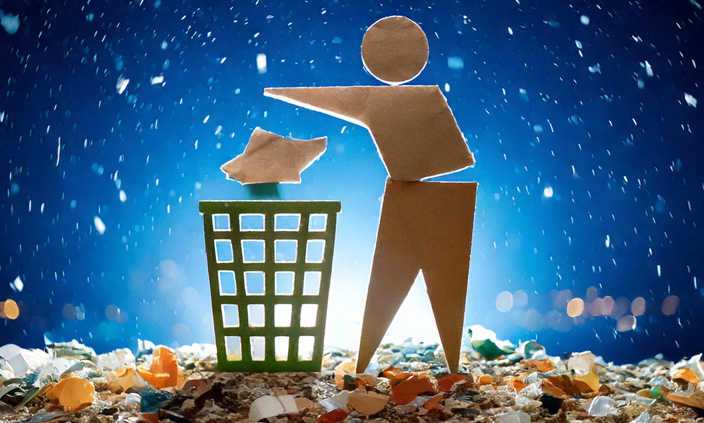
A Guide to everyday recycling symbols
But, with so many symbols, it can get a little confusing. Our friends in Repak have compiled a simple guide to familiar symbols to help you make sense of it all.
Recycling symbols now appear on everyday items and packaging to keep you in the loop. The symbols will let you know if a product can or can’t be recycled.
It’s important that you can identify and understand these symbols so that you can play your part in recycling, always remembering to put the right thing in the right bin, CLEAN, DRY and LOOSE.
Below are some of the more common ones…
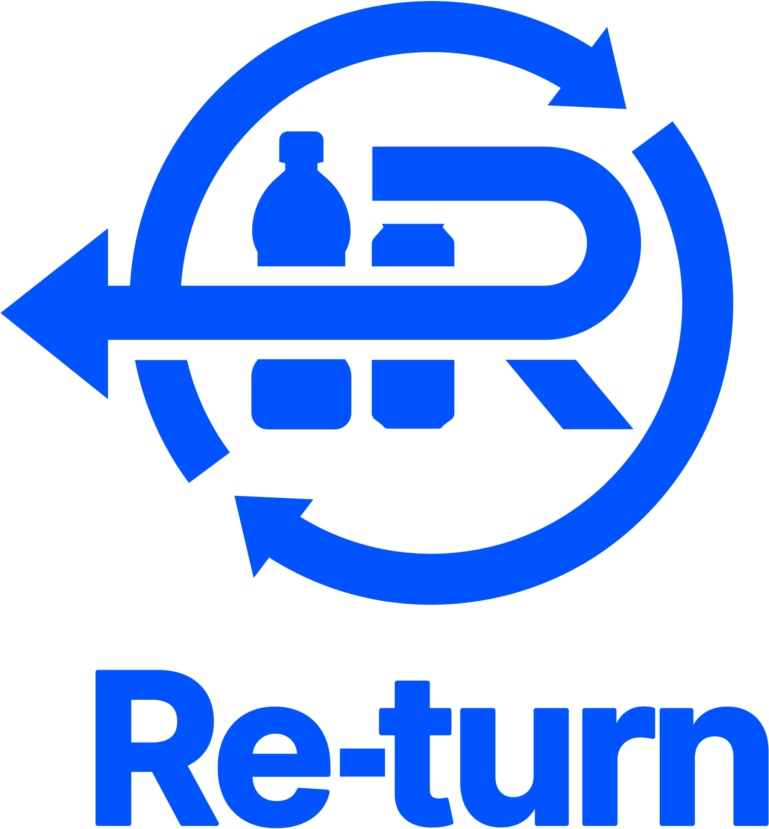
A relatively new logo to recognise. When you buy a drink in a container with the Re-turn logo, you are charged a small refundable deposit. You can then claim back the levy by returning the empty container.

This a European trademark and it means that suppliers and producers have contributed financially to the recycling of packaging in Europe. For example, Repak Members can use this symbol on their packaging as they pay fees to Repak to fund recycling in Ireland. The symbol does not necessarily mean that the packaging is recyclable, has been recycled or will be recycled.
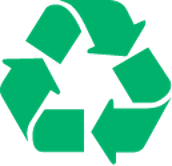
The Mobius symbol indicates that a product’s packaging can be recycled, not that it has been recycled or that it is accepted in all recycling collection systems. The symbol may be accompanied by a percentage figure in the middle to explain that x% of the packaging is recycled.
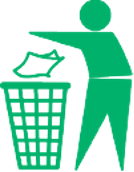
The ‘Tidyman’ symbol asks you not to litter. It is a reminder to dispose of your waste carefully and thoughtfully.

MyWaste.ie (an initiative brought to you by the Regional Waste Management Offices on behalf of the Department of Climate Action, Communications and the Environment) has developed its own symbols for use on packaging in Ireland. This symbol indicates that packaging can be recycled in your household recycling bin. For more information see MyWaste.ie
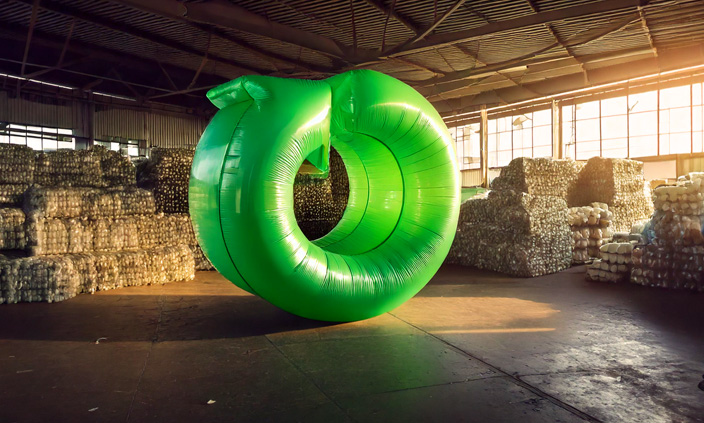
Closing the Loop — The Life Cycle of Recycled Products
Recycling is more than just tossing your waste into the correct bin. Every item we recycle embarks on a transformative journey, contributing to a circular economy where materials are continuously reused and repurposed.
In this blog post, we’ll explore the life cycle of recycled products, how they are transformed into new materials, and why it’s important to continue improving recycling habits both at home and in the workplace. We’ll also highlight how Ireland is progressing with its recycling goals and provide actionable steps to make a bigger impact.
-
The Collection and Sorting Process
The first stage in the life cycle of a recycled product starts with proper sorting and collection. Once materials like paper, plastic, glass, and metals are placed in the correct bins, they are collected by waste management companies and transported to sorting facilities. Here, recyclable materials are separated into different streams using both manual labour and automated machines.
Ireland’s Progress: According to the Environmental Protection Agency (EPA), Ireland achieved a municipal waste recycling rate of 41% in 2021 Home. However, contamination remains an issue, which makes sorting even more critical to ensuring materials are properly recycled.
Tip: At home and at work, ensure that items placed in recycling bins are clean and sorted correctly to avoid contamination and increase the chances of successful recycling.
-
Processing and Manufacturing of Recycled Materials
Once the materials are sorted, they are sent to processing plants where they undergo transformation into raw materials. For example:
- Paper is cleaned, pulped, and remade into new paper products such as newspapers, office paper, and cardboard.
- Plastics are shredded, melted, and reformed into pellets that can be used to create new plastic items like packaging or outdoor furniture.
- Glass is crushed, melted, and reformed into new glass bottles or jars, often using less energy than creating new glass from raw materials.
Statistic: Ireland’s recycling efforts resulted in the collection of 1.2 million tonnes of packaging waste in 2021, with 58% being successfully recycled Home. By increasing recycling rates, we can ensure more materials are processed and repurposed.
-
The Role of Recycled Products in Manufacturing
The next stage in the life cycle of recycled products is their integration into new products. Many industries use recycled materials in manufacturing to reduce costs and lower their environmental impact. For example:
- Plastic bottles can be turned into fleece clothing, carpeting, or construction materials.
- Recycled metals such as aluminium are used to create everything from new cans to parts for vehicles.
- Recycled glass can be used in construction as an aggregate or even in making new glass containers.
This stage of the life cycle emphasizes the importance of separating materials for recycling, as manufacturers rely on clean and quality recycled content to create new products.
Tip: Encourage the purchase of products made from recycled materials both at home and in the office. This helps close the recycling loop and supports the continued demand for recycled goods.
-
Closing the Loop: Consumer Use of Recycled Products
After recycled materials are transformed into new products, they are once again introduced to consumers. The cycle continues when these items are used and, at the end of their lifespan, recycled once more.
For example:
- Recycled office paper can be used in the workplace, and when discarded properly, it can be recycled again into more paper products.
- A plastic bottle used by a consumer can be recycled and re-enter the market as part of a new product, like garden furniture.
Statistic: The use of recycled materials reduces the need for virgin raw materials. Recycling aluminium, for example, saves 95% of the energy required to produce aluminium from raw bauxite Home. By reusing materials, we conserve natural resources and lower carbon emissions.
-
Why Improving Recycling Habits Matters
The life cycle of recycled products illustrates how every item we recycle can make a difference in creating new products and reducing environmental impact. By recycling correctly at home and at work, we support this circular system, reducing the need for raw materials and conserving energy.
Challenges in Ireland: While Ireland has made significant progress, challenges remain. For example, plastic packaging recycling rates were only 32.7% in 2021, falling short of the EU’s upcoming targets Home. Increasing education on proper recycling and encouraging the use of recycled products can help Ireland meet these targets.
Conclusion
Understanding the life cycle of recycled products helps us realise the importance of recycling correctly. From collection to processing, and from manufacturing to consumer use, every item we recycle contributes to reducing waste, conserving resources, and supporting the circular economy. Whether at home or in the workplace, by making small changes to improve recycling habits, we can have a big impact on the environment.
#SortItCampaign #LifeCycleOfRecycling #Sustainability #EcoFriendly #RecycledProducts #WasteManagement
Let’s all work together to improve our recycling habits and ensure that materials continue to be reused in Ireland’s growing circular economy.
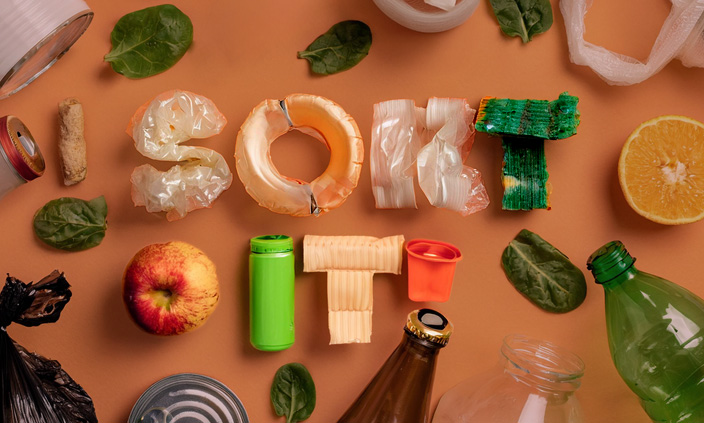
Common Recycling Mistakes To Avoid
Recycling is one of the easiest and most impactful ways to contribute to a more sustainable planet.
However, even well-intentioned recyclers can make mistakes that reduce the effectiveness of recycling efforts. In Ireland, recycling contamination is a major issue that can lead to entire batches of recyclable material being sent to landfill instead of being reused. By identifying and avoiding common recycling mistakes, we can significantly improve recycling outcomes both at home and at work. In this post, we’ll discuss some of the most common recycling mistakes and provide tips on how to avoid them.
Placing Non-Recyclable Items in the Recycling Bin
One of the most common mistakes people make is assuming that everything can be recycled. Items such as soiled or dirty plastic bags, disposable coffee cups, and greasy pizza boxes are often mistakenly placed in recycling bins. These items can contaminate recyclable materials, making the whole batch unrecyclable.
Tip: Always check your local council’s guidelines on what can and cannot be recycled. In Ireland, the key recyclable items are clean plastic bottles and containers, paper, cardboard, and cans. Items like soiled or dirty plastic bags, and food-soiled packaging should not be placed in the recycling bin (Home).
Not Cleaning Recyclables Properly
Food residues and liquids left in containers can contaminate other recyclable materials, rendering them unfit for recycling. For example, a jar of peanut butter that hasn’t been rinsed can ruin an entire batch of paper or cardboard that comes into contact with it.
Tip: Take a few moments to rinse out bottles, jars, and containers before placing them in the recycling bin. This helps ensure that the materials can be properly processed without contamination.
Recycling Plastic Bags and Soft Plastics
In Ireland, plastic bags and soft plastics are a common source of recycling contamination. While many people assume they are recyclable, these items can cause issues in recycling plants by jamming machinery. Soft plastics like cling film, crisp packets, and shopping bags should not be placed in household recycling bins.
Statistic: According to Repak, an organization dedicated to recycling packaging in Ireland, only 32.7% of plastic packaging was recycled in 2022 (Repak). Properly segregating soft plastics from recyclable materials is crucial to improving this rate.
Tip: Many supermarkets and large retailers offer dedicated bins for recycling soft plastics. Use these collection points for items like plastic bags and plastic film instead of your household recycling bin.
Recycling Coffee Cups and Takeaway Containers
Disposable coffee cups and certain takeaway containers are another common mistake. While they may seem like recyclable materials, most disposable coffee cups are lined with plastic, which makes them difficult to recycle. Similarly, many takeaway containers are contaminated with food, making them unsuitable for recycling.
Tip: Instead of recycling, look for dedicated composting solutions for food-contaminated containers or switch to reusable coffee cups and food containers. Many cafes now offer discounts if you bring your own cup.
Ignoring the “Check Locally” Label on Plastics
Some plastic items, especially those labelled with a recycling symbol and a number, might not be recyclable through your local system. These items often require specialized recycling facilities that are not available in all regions. The label “check locally” means that while the material might be technically recyclable, it isn’t accepted by all recycling programs.
Tip: Before recycling plastic items with unfamiliar symbols, visit your local council’s website to check what types of plastics are accepted in your area.
Not Flattening Cardboard Boxes
Large, unflattened cardboard boxes take up a lot of space in recycling bins and can cause inefficiencies in the collection process. If not properly flattened, they may also not be picked up for recycling.
Tip: Always flatten cardboard boxes before placing them in the recycling bin to save space and make collection easier.
Recycling Electronics in the General Recycling Bin
Old batteries, mobile phones, and other electronic devices should never be thrown into general recycling bins. Not only can they cause fires in waste facilities due to the batteries inside, but they also contain materials that need to be processed separately from standard recyclables.
Statistic: In 2022, Ireland collected 10.35 kg of Waste Electrical and Electronic Equipment (WEEE) per capita, surpassing the EU minimum collection target (Central Statistics Office). However, many electronics still end up in general waste streams.
Tip: Always bring old electronics to a dedicated WEEE collection point. These are available at recycling centres, electronic stores, and even some supermarkets.
Throwing Out Reusable Items
Finally, one of the most wasteful mistakes is throwing out items that can be reused. Many items, such as furniture, clothing, and appliances, can be repaired, donated, or repurposed instead of being discarded.
Tip: Before throwing something away, consider whether it can be donated, repurposed, or repaired. Many communities have “freecycling” groups where people can give away or pick up used items.
Conclusion
Improving recycling efforts at home and at work starts with avoiding common recycling mistakes. By being more mindful of what can and cannot be recycled, cleaning recyclables, and using the appropriate disposal methods for items like electronics and soft plastics, we can significantly reduce waste contamination and improve Ireland’s recycling rates.
Statistic: In 2021, Ireland’s overall recycling rate was 41% for municipal waste, with more progress needed to meet the 50% target set for 2025 (Home). By reducing mistakes, we can help reach these goals and support a more sustainable future.

The Economics of Recycling: Why It’s a Smart Investment for Businesses
Recycling is often championed for its environmental benefits, but the economic advantages are just as compelling. In Ireland, where waste generation continues to grow, recycling presents an opportunity for businesses to not only reduce their environmental impact but also to save money, create jobs, and improve their bottom line. In this post, we’ll explore the economics of recycling with a focus on how it can benefit Irish businesses and workers.
-
Cost Savings Through Reduced Waste Disposal
One of the primary financial benefits of recycling is the reduction in waste disposal costs. In Ireland, landfill disposal fees have increased significantly in recent years, making it costly for businesses to rely on traditional waste disposal methods. As of 2023, the landfill levy stands at €75 per tonne (Home). By reducing the amount of waste sent to landfills through recycling, companies can significantly lower their waste management expenses.
Example: A typical office that switches to a robust recycling system for paper, plastic, and glass can reduce the number of general waste collections required, resulting in direct cost savings on waste disposal fees.
Tip: Encourage employees to reduce, reuse, and recycle through educational campaigns and by placing recycling stations in key areas of the office, such as kitchens, print areas, and break rooms.
-
Revenue from Recyclable Materials
Certain recyclable materials—such as metals, plastics, and paper—can be sold to recycling facilities, providing businesses with an additional revenue stream. Ireland has a well-established market for recycling materials, particularly metals. According to Repak, an Irish organization specializing in packaging recycling, Ireland exceeded its EU targets in 2022, with a recycling rate of 75% for paper and 69% for metals (Repak).
Example: A manufacturing company that recycles scrap metal or off-cuts can sell these materials to recycling processors, which reduces waste and generates extra income. Some businesses may even qualify for rebates based on the volume and quality of the recyclables they produce.
-
Job Creation in the Recycling Industry
Recycling is a more labour-intensive process than landfilling or incineration, and as a result, it creates more jobs. In Ireland, the recycling industry provides employment opportunities in areas such as collection, sorting, and processing of recyclable materials. It is estimated that recycling creates 10 jobs for every 1 job in landfilling (Home).
Statistic: Ireland’s waste management sector is growing, with over 1,000 people employed directly in recycling-related roles across the country (Home). By supporting recycling initiatives, businesses not only contribute to environmental sustainability but also help create jobs in local communities.
-
Reduced Environmental and Economic Costs of Landfill Use
Ireland faces increasing pressure to reduce its reliance on landfills due to environmental concerns and rising landfill management costs. Sending waste to landfills not only harms the environment but also incurs significant long-term expenses for monitoring and maintaining these sites. In 2021, Ireland generated 1.84 million tonnes of household waste, of which only 41% was recycled (Home) (Home). Increasing recycling rates would significantly reduce the strain on landfills and associated costs.
Environmental Impact: By diverting waste from landfills, businesses help to lower methane emissions, a potent greenhouse gas produced by organic waste in landfills. This contributes to Ireland’s climate goals and helps avoid future regulatory costs associated with carbon emissions.
-
Building a Circular Economy
A circular economy keeps materials in use for as long as possible, extracting maximum value before recycling and regenerating them at the end of their lifecycle. In Ireland, the government is committed to promoting the circular economy through initiatives such as the Circular Economy Bill 2021, which encourages businesses to adopt recycling and waste reduction practices (CSO).
Example: Electronics manufacturers can participate in the circular economy by recycling rare earth metals and components from old devices, reducing their need for new raw materials. This not only lowers costs but also helps stabilize supply chains that are vulnerable to price fluctuations in virgin materials.
-
Improved Brand Reputation and Customer Loyalty
Sustainability has become a key differentiator for businesses, with eco-conscious consumers actively seeking out brands that are committed to environmental responsibility. By integrating recycling programs and sustainability initiatives, businesses can enhance their public image and attract customers who prioritize green practices.
Statistic: A survey conducted by Repak Team Green found that 85% of Irish consumers consider the environmental impact of their purchasing decisions (Repak). Businesses that highlight their recycling and waste reduction efforts can build stronger relationships with these consumers and enhance customer loyalty.
Conclusion
For Irish businesses, the economics of recycling presents a compelling case for sustainability. By reducing waste disposal costs, generating revenue from recyclables, creating jobs, and improving brand reputation, companies can make recycling a win-win strategy. Additionally, supporting recycling helps Ireland meet its environmental targets, reduce landfill reliance, and build a more circular economy.

Sustainability in the Workplace: Let’s Work Together!
As the focus on sustainability continues to grow, offices have become key areas where significant environmental impact can be made. Implementing sustainable practices within the workplace not only helps the environment but can also create a more positive and engaging work culture. In this blog post, we’ll share some handy hints to help improve recycling efforts and promote sustainability among workers in your office.
-
Set Up Clearly Labelled Recycling Stations
One of the simplest ways to encourage recycling in the office is by setting up clearly labelled recycling stations. Ensure that bins for paper, plastics, glass, and general waste are easily accessible and clearly marked. This reduces confusion and makes it easier for employees to dispose of their waste correctly.
Tip: Place recycling stations in high-traffic areas such as the kitchen, near printers, and in break rooms. Include posters or guides above the bins to remind staff of what can and cannot be recycled.
-
Encourage Paperless Practices
The digital age offers countless opportunities to reduce paper use in the office. Encourage employees to embrace paperless practices by using digital documents, emails, and cloud storage instead of printing.
Tip: Set printers to double-sided printing by default and encourage staff to think before they print. Offer training sessions on digital tools that can help reduce paper usage, such as PDF editing software or cloud collaboration platforms.
-
Reuse Office Supplies
Before purchasing new office supplies, consider whether existing items can be reused or repurposed. Items like file folders, binders, and envelopes can often be used multiple times before they need to be replaced.
Tip: Create a designated area for reusable supplies where employees can drop off or pick up items they no longer need. This can reduce the demand for new supplies and minimize waste.
-
Promote the Use of Reusable Items
Encourage employees to use reusable items such as coffee mugs, water bottles, and lunch containers. This reduces the amount of single-use plastic and paper waste generated in the office.
Tip: Provide reusable items branded with the company logo as part of an eco-friendly welcome pack for new employees. Consider setting up a dishwasher in the office kitchen to make it easier for staff to clean and reuse their items.
-
Organise Office Recycling Challenges
Make recycling fun by organizing office-wide recycling challenges. Set goals for reducing waste or increasing recycling rates, and offer rewards for teams or individuals who achieve the best results.
Tip: Track the office’s recycling progress and share updates regularly. Consider rewarding the winning team with a lunch outing, extra break time, or a donation to an environmental charity in their name.
-
Educate and Engage Employees
Education is key to improving sustainability in the workplace. Provide regular training sessions or workshops on recycling and sustainable practices. Share tips and success stories in company newsletters or on the intranet.
Tip: Invite guest speakers from local recycling organizations or environmental groups to give presentations or hold Q&A sessions with employees. This can provide valuable insights and inspire further action.
-
Implement a Green Office Program
Consider implementing a formal green office program that includes policies and practices focused on sustainability. This can range from simple initiatives like energy-saving measures to comprehensive programs that address all aspects of office operations.
Tip: Establish a “Green Team” of volunteers who are passionate about sustainability. They can help drive the program, monitor progress, and come up with new ideas to improve the office’s environmental impact.
-
Reduce Energy Consumption
Encouraging energy-saving habits is another important aspect of sustainability. Simple actions like turning off lights when not in use, using energy-efficient appliances, and setting computers to sleep mode can make a big difference.
Tip: Install motion sensors for office lighting in less frequently used areas such as storage rooms and bathrooms. Encourage staff to unplug chargers and electronics when they’re not in use to avoid phantom energy drain.
Conclusion
Improving sustainability in the office is not only beneficial for the environment but also for the overall well-being and morale of employees. By implementing these handy hints, you can create a more eco-friendly workplace that encourages recycling and sustainable practices among workers. Let’s work together to make our offices greener and more responsible places to work.
#SortItCampaign #Sustainability #OfficeRecycling #EcoFriendly #GreenOffice #WasteManagement
Encouraging sustainable habits in the workplace is a collective effort. Start small, but think big—every action counts toward a more sustainable future!
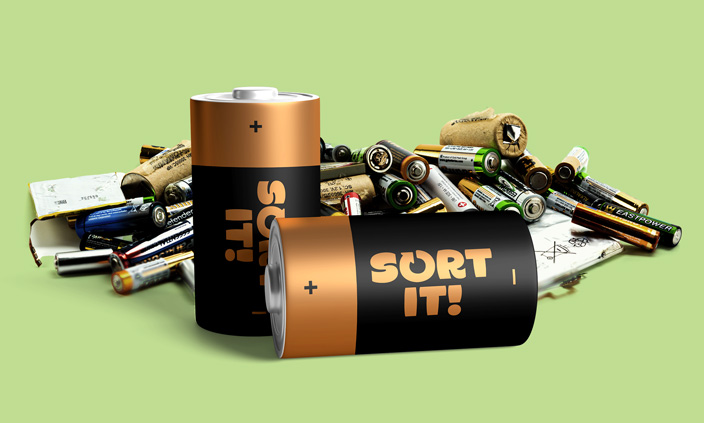
Recycling Batteries: Taking A Positive Approach
Batteries are an essential part of our everyday lives, powering everything from remote controls to smartphones. However, when they are no longer useful, it’s crucial to dispose of them properly. Recycling batteries is not just about reducing waste; it’s about preventing environmental damage and serious safety hazards. In this blog post, we’ll explore why it’s important to recycle batteries properly and the dangers of putting them in regular waste bins.
The Environmental Impact of Improper Battery Disposal
Batteries contain a variety of hazardous materials, including heavy metals like lead, mercury, and cadmium, as well as acids that can be harmful to the environment if not handled properly. When batteries are thrown in the trash and end up in landfills, these toxic substances can leach into the soil and water, contaminating ecosystems and posing risks to wildlife and human health.
Key Environmental Risks:
- Soil and Water Contamination: The chemicals in batteries can seep into the ground, affecting soil quality and potentially entering groundwater supplies.
- Air Pollution: When incinerated, batteries release toxic fumes and heavy metals into the air, contributing to air pollution.
- Resource Wastage: Batteries contain valuable materials like lithium and cobalt that can be recovered and reused if properly recycled.
In Ireland, the importance of recycling batteries has been recognized through various initiatives. The country has made strides in battery recycling, but there is still a need for increased awareness and participation. In 2021, Ireland achieved a collection rate of approximately 48% for portable batteries, indicating that nearly half of the batteries sold were recycled, but there is room for improvement(Repak).
The Dangers of Putting Batteries in Waste Bins
One of the most serious dangers of improperly disposing of batteries in regular waste bins is the risk of fire. Batteries, especially lithium-ion types commonly used in electronics, can short-circuit when their terminals come into contact with metal or other conductive materials. This can lead to overheating, leakage, or even explosions, causing fires in waste bins, collection trucks, and landfill sites.
Fire Hazards:
- Short Circuits: When batteries are damaged or come into contact with metal, they can short-circuit, leading to overheating and potentially starting a fire.
- Combustible Materials: Waste bins and landfills contain a mix of materials, many of which are combustible. A single battery fire can quickly spread, causing significant damage.
- Safety Risks: Fires caused by batteries not only pose risks to property but also to the safety of waste management workers and emergency responders.
There have been numerous reports of fires in waste management facilities linked to improperly disposed of batteries. These incidents highlight the importance of keeping batteries out of general waste and ensuring they are recycled through proper channels.
How to Recycle Batteries Properly
Recycling batteries is easy and convenient, especially with the many collection points available throughout Ireland. Here are some tips to ensure you’re recycling batteries correctly:
- Use Designated Collection Points: Most supermarkets, electronic stores, and recycling centres have designated bins for battery disposal. Take your used batteries to these collection points rather than putting them in the trash.
- Store Batteries Safely: If you’re collecting batteries at home before recycling them, store them in a cool, dry place, away from metal objects. Consider taping the terminals of lithium-ion batteries to prevent short circuits.
- Check Local Programs: Many communities offer special battery recycling programs or events. Check with your local council or waste management authority to find out what options are available near you.
Recycling batteries properly is not just about being environmentally responsible; it’s about preventing serious safety hazards and protecting our communities. By taking the time to recycle batteries correctly, you can help reduce environmental pollution, conserve valuable resources, and prevent dangerous fires. Let’s all do our part to ensure that batteries are recycled safely and effectively.
#SortItCampaign #BatteryRecycling #Sustainability #EcoFriendly #WasteManagement #SafetyFirst
Remember, every battery counts. Recycle them properly and help keep our planet safe and sustainable for future generations.
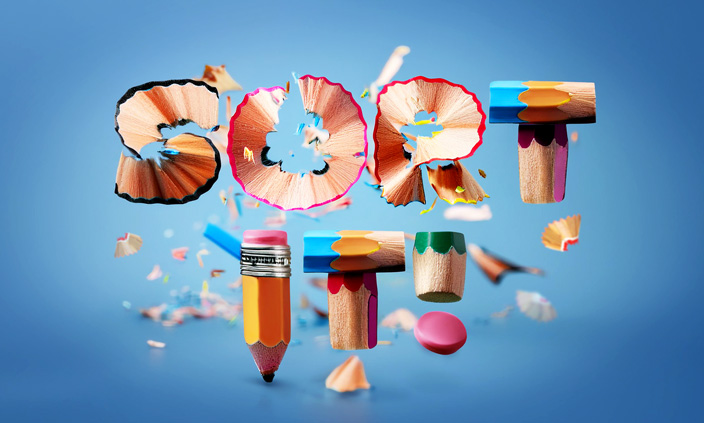
Back-to-School Sustainability: Handy Tips to become an ‘A’ Student
As the new school year begins, it’s the perfect time to instill sustainable habits in students. Schools are environments where significant amounts of waste are generated, making them ideal places to teach and practice recycling. By incorporating simple, practical steps, we can improve recycling efforts among students and contribute to a greener future.
Here are some handy hints to help kids and parents boost sustainability as they head back to school.
1. Pack Waste-Free Lunches
One of the easiest ways to reduce waste is by packing waste-free lunches. Use reusable containers, water bottles, and cutlery instead of single-use plastic items. Encourage kids to bring home any uneaten food and packaging, so it can be properly sorted and recycled at home.
Tip: Invest in durable lunchboxes and snack containers that can be used throughout the school year. Consider using beeswax wraps instead of plastic wrap to keep food fresh.
2. Use Recycled School Supplies
Choose school supplies made from recycled materials whenever possible. Many manufacturers offer notebooks, pencils, and other supplies that are made from post-consumer waste. Not only does this reduce demand for new resources, but it also teaches kids the value of recycling.
Tip: Look for items with the recycling symbol on the packaging, indicating they are made from recycled content.
3. Implement a Classroom Recycling System
Teachers can set up a simple recycling system in the classroom. Provide clearly labelled bins for paper, plastic, and other recyclables. Teach students what materials can be recycled and how to properly sort them.
Tip: Make recycling a part of the daily classroom routine. Assign students as “recycling monitors” to ensure the bins are used correctly and to empty them regularly.
4. Encourage Reuse of School Supplies
Before buying new supplies, check what can be reused from the previous year. Items like backpacks, binders, and even notebooks with unused pages can be carried over. This reduces waste and saves money.
Tip: Decorate old supplies with stickers or other embellishments to give them a fresh look and make them feel new again.
5. Promote Eco-Friendly Transportation
Encourage walking, biking, or carpooling to school to reduce the environmental impact of transportation. Fewer cars on the road mean less pollution and a smaller carbon footprint.
Tip: Organize a “walk to school” day or set up a carpooling system with other parents to make it easier and more fun for kids.
6. Start a Green Club
Schools can foster environmental awareness by starting a green club where students can learn about sustainability, participate in recycling projects, and even start their own initiatives to reduce waste at school.
Tip: Use the green club to spearhead school-wide campaigns, such as a drive to collect and recycle batteries or electronic waste.
7. Teach the 3 Rs: Reduce, Reuse, Recycle
Incorporate lessons on the 3 Rs into the curriculum. Understanding how to reduce, reuse, and recycle helps students grasp the importance of sustainability. Practical activities, like making crafts from recycled materials, can make learning about the 3 Rs fun and engaging.
Tip: Challenge students to come up with creative ways to reduce waste in their daily lives, both at school and at home.
8. Digital Homework and Notices
Encourage the use of digital platforms for homework and school notices to reduce paper waste. Many schools now use online portals for assignments, which not only cuts down on paper use but also helps students develop digital literacy skills.
Tip: For schools that still use paper notices, suggest transitioning to email or a school app to communicate with parents.
—
Conclusion
As students head back to school, it’s the perfect opportunity to incorporate sustainable practices into their daily routines. By following these handy hints, we can help foster a culture of recycling and environmental responsibility that students will carry with them beyond the classroom. Let’s work together to make this school year not just successful, but also sustainable.
#SortItCampaign #Sustainability #BackToSchool #Recycling #EcoFriendly #GreenSchools